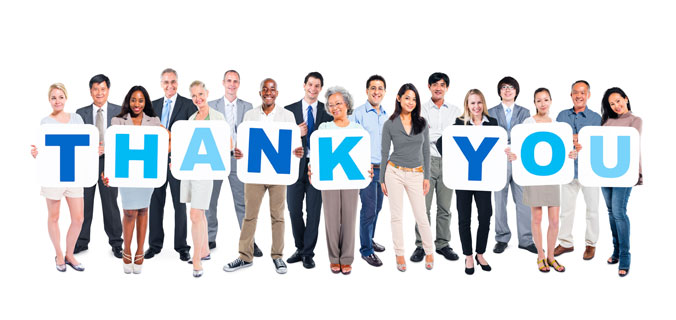I have a never-fail business tip for you and it’s one of the earliest lessons we were ever taught as a child: say “thank you.”
The value of these two sorely underused words goes far beyond a simple courtesy, which alone might be reason enough to utter them more. Saying “thank you” (or just “thanks”) will help maintain and grow your business.
I observe people. What makes people tick and do the things they do is a lifelong passion of mine. Why do I always go to the same butcher shop? Why does Jane take her car to the same mechanic? What keeps Tom going back to that same grocer week after week, even in light of new competition? In part, it’s their routine, but what drives and reinforces these particular routines?
Part of a customer’ motivation is based on the fact that they appreciate good, top-quality product and exceptional service, but they also appreciate being appreciated. That’s where the art of saying “thanks” comes in. It may seem like just a warm-and-fuzzy, feel-good thing to do, but there’s science to it.
Experts suggest that 90% of all purchasing decisions are made subconsciously1. That’s an extraordinary number of decisions—thousands a day—being made based on emotion, intuition or one’s gut. In his book Descartes’ Error, neuroscientist Antonio Damasio argues that emotions are, in fact, an essential ingredient to all decisions. It’s been found that we cannot make decisions without them.
The effect of emotions on our behaviour as consumers is widely documented. Experts even suggest that if you don’t make an emotional attachment to customers, then customer satisfaction itself is worthless2. It sounds like an almost outrageous claim, but studies by Gallup suggest that emotional connection is the key ingredient in turning satisfied customers into what the group calls “fully engaged” customers. These customers were found to visit 32% more often and spend 46% more money than those without such emotional bonds.
This is why showing gratitude to customers makes such a huge difference. I know from countless conversations with independent dealers of the business-changing impact of gratitude. Being greeted with a “Hi, Ken! How are you?” as you enter a store, and told “Thanks for your business” as you leave causes something powerful to happen on both an intellectual and emotional level. It starts to quickly build loyalty and create an emotional attachment.

In that way, the more a customer shops at your store (and is shown appreciation, of course), the more they want to shop at your store. Think about times you’ve been shown appreciation for your business. How do you feel about doing business with those retailers? Now consider the effect that sense of appreciation has on word of mouth; how often do you mention those businesses to friends?
The 19th and early 20th century U.S. philosopher and psychologist William James once said, “The deepest principle in human nature is the craving to be appreciated.” We all want to feel appreciated, and saying “thank you” is a great place to start in communicating it.
In all my years of Executive/Sales Training, not one instructor ever taught me the “power of thank you.” The simplicity of these two words, delivered in a sincere manner, will have a profound impact on your customer. As I have observed, the most successful entrepreneurs are masters at practising the art of appreciation with both their customers and employees. So the next time you have a customer standing in front of you, step out from behind the counter, make eye contact, and sincerely say, “Thank you for giving me your business.”
I have a challenge for you: for the next week, mentally record how often anyone around you says “thank you” and include yourself. Observe the impact it has on the recipient and how they respond. Let me know what you discover.
References
